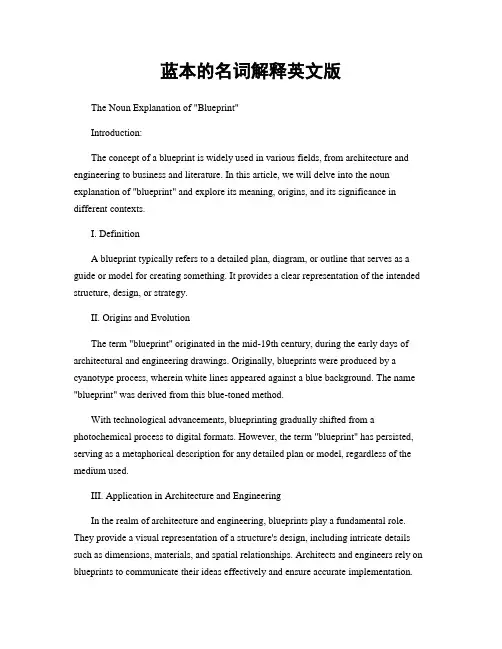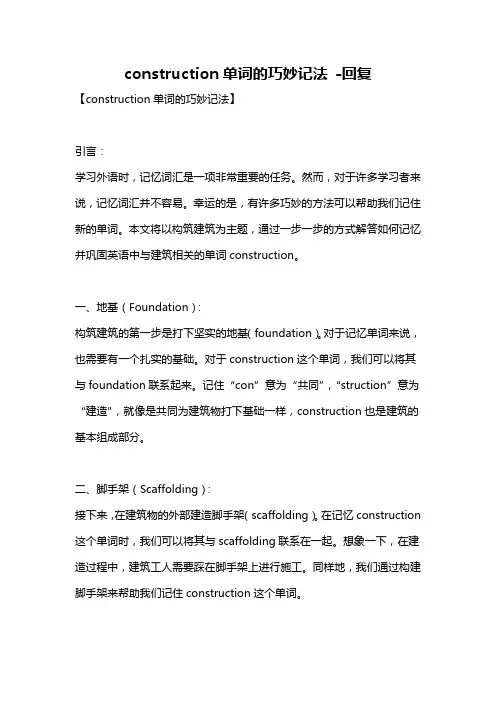blueprint
- 格式:pdf
- 大小:330.03 KB
- 文档页数:76

蓝本的名词解释英文版The Noun Explanation of "Blueprint"Introduction:The concept of a blueprint is widely used in various fields, from architecture and engineering to business and literature. In this article, we will delve into the noun explanation of "blueprint" and explore its meaning, origins, and its significance in different contexts.I. DefinitionA blueprint typically refers to a detailed plan, diagram, or outline that serves as a guide or model for creating something. It provides a clear representation of the intended structure, design, or strategy.II. Origins and EvolutionThe term "blueprint" originated in the mid-19th century, during the early days of architectural and engineering drawings. Originally, blueprints were produced by a cyanotype process, wherein white lines appeared against a blue background. The name "blueprint" was derived from this blue-toned method.With technological advancements, blueprinting gradually shifted from a photochemical process to digital formats. However, the term "blueprint" has persisted, serving as a metaphorical description for any detailed plan or model, regardless of the medium used.III. Application in Architecture and EngineeringIn the realm of architecture and engineering, blueprints play a fundamental role. They provide a visual representation of a structure's design, including intricate details such as dimensions, materials, and spatial relationships. Architects and engineers rely on blueprints to communicate their ideas effectively and ensure accurate implementation.During the construction phase, blueprints serve as a reference point for contractors, enabling them to execute the project according to the intended specifications. The blueprint acts as a guide, ensuring consistency and minimizing errors throughout the construction process.IV. Blueprints in Business and Project ManagementBeyond the realm of construction, blueprints find applications in various business sectors and project management. They serve as a roadmap or strategic plan, outlining the goals, methods, and resources required to achieve a desired outcome.Businesses often create blueprints for marketing campaigns, organizational restructuring, or product development. These blueprints serve as a reference for employees and stakeholders, helping them align their efforts towards a common objective.In project management, blueprints are instrumental in driving successful outcomes. Project managers utilize blueprints to define project scope, allocate resources, outline milestones, and monitor progress. By providing a holistic overview, blueprints help teams stay on track and achieve project goals.V. Literary InterpretationsBlueprints extend beyond technical and professional domains and find their way into literary works. In literature, a blueprint can refer to a thematic or structural plan that guides the development of a story. It outlines the narrative arc, character relationships, and key events, providing a framework for the author's creative process.Authors often use blueprints to flesh out complex plots, ensuring consistency and coherence throughout their work. These blueprints may exist in the form of outlines, mind maps, or storyboards, serving as a foundation for the narrative's evolution.VI. Symbolic SignificanceApart from its practical applications, the concept of a blueprint holds symbolic significance in our collective consciousness. It represents the power of foresight andplanning, offering hope and assurance in uncertain times. Blueprints embody the idea that diligent preparation and careful thought can lead to successful outcomes.Moreover, blueprints symbolize progress, innovation, and human ingenuity. They remind us of our capacity to envision and create, bridging the gap between imagination and reality.Conclusion:In conclusion, the noun explanation of "blueprint" encompasses a diverse range of fields and applications. From its origins in architecture to its relevance in business and literature, the concept of a blueprint serves as a guiding framework for planning, creating, and achieving. Whether tangible or metaphorical, blueprints represent our ability to shape the world around us with vision, precision, and purpose.。

所有的系统都是专为个人部署和浅水勘测所设计,测量深度可达30m(100英尺),这使得它们适用于港口港湾勘测和安全工作,包括河流、运河、湖泊等内陆水质检测,探测沉船的位置以及搜寻复原任务。
海远程地区。
StarFish系统被设计为“即插即用”,通过机顶盒上的USB接口连接到您的PC /笔记本电脑。
机顶盒使得声呐的电源可以由来自交流电源(市电电源)或直流电源(蓄电池,发电组)提供,并且每一个系统均有多个适配器电缆提供,使其可以直接应用现有的电源条件。
专为Windows操作系统所设计的StarFish扫描软件非常直观,具有易于使用的用户界面。
通过帮助向导开始,你很快就可以上手运行。
一架双引擎霍克斯利飞机残骸,沉没在15米深。
芬兰海湾深度为33米的蒸汽轮船-由Ari Kapenen提供混凝土排放在海港泊位-由Marek Szatan,Hydrograf提供在10米处潜水员和救援假人 澳大利亚Blackwall Reach河上的货运驳船和划艇—由Jesse Rodocker提供 StarFish是使用最新的声学技术和信号处理技术的侧扫声呐系统,性价比高,能带来高质量的水下图像。
StarFish拖曳系统易于携带,每个声呐小于15英寸长。
这使它们能够在需要的时候共享用户组和水上船只之间的信息,尤其是在其他侧扫系统难以执行的浅声呐StarFish 990FStarFish 452FStarFish 450FStarFish 450HStarFish 453OEMBP00181BP00184BP00017BP00090(20m) or BP00066 (5m)BP00755StarFish的选择高清晰度系统,结合了1MHz的无线信号与0.3°水平波束宽度,适用于搜索和救援的应用。
450kHz无线信号操作与0.8°水平波束宽度,高达200米的宽度范围。
适用于调查应用。
入门级的声纳系统,结合450kHz无线信号操作与1.7°水450F系统的船载版本,适合小型近海船艇在浅水中操作。

蓝图晒图纸俗称“蓝图纸”,是一种化学涂料加工纸,专供各种工程设计、机械制造晒图之用,是生产与科研、建设中必不可少的用品。
什么是蓝图展开词目:蓝图拼音:lán tú英文:blueprint 基本解释 1. [blueprint] 2. 通常用铁氰化和铁盐敏化的纸或布,曝光后用清水冲洗显影晒成的蓝底白图的相纸,特别供晒印地图、机械图、建筑图样用 3. 一个详细的、各部分完全协调的计划或行动规划建设蓝图详细解释 1. 用感光后变成蓝色或其他颜色的感光纸制成的图纸。
供工程设计施工或编绘地图等用。
许地山《危巢坠简·铁鱼底鳃》:“他说,他一听见警报,什么都不拿,就拿着那卷蓝图出外躲避。
”孙犁《书的梦》:“市民要修房建房,必须请这里的技术员,去丈量地基绘制蓝图,看有没有侵占房基线。
” 2. 比喻规划,计划。
萧乾《未带地图的旅人》十四:“我作记者之前,就先为自己的生活划了个蓝图,或者说规定了条航线。
”陈世旭《小镇上的将军》:“当小镇人按照新世纪的蓝图,着手小镇建设的时候,首先想到的,是把将军的宿愿付诸实现。
”比喻规划、计划萧乾《未带地图的旅人》十四:“我作记者之前,就先为自己的生活划了个蓝图,或者说规定了条航线。
”陈世旭《小镇上的将军》:“当小镇人按照新世纪的蓝图,着手小镇建设的时候,首先想到的,是把将军的宿愿付诸实现。
”文学中的“蓝图”通常是指希望和前景,指正在创建的美好未来。
化学涂料加工纸.生产晒图纸与各地文化用品商店联系经销;或简单利用晒蓝图方法,开店承揽晒图服务。
各地操此业者甚少,承办此业当十分兴旺,均可取得很好的经济效益。
(一)晒图纸的品种与规格:晒图纸因纸基不同,分特号和一号两大类,特号原纸90克或80克,生产出的晒图纸供制作需较长期保管的资料和供应出口,或缓外工程图纸用。
一号图纸为80克,供和般晒图用,国内绝大部分地区都是用一号晒图纸。
晒图纸的规格有平板和卷筒两种。
卷筒国家规定的宽度为88厘米,为适应个别单位的特殊需要,也有生产宽为93.63厘米的两种,以卷为单位,每卷长度有50或100米的,平板晒图纸有的地方叫技术纸,其标准规格:0号为841×1189毫米(全开),1号为对开,2号为4开,3号为8开,4号为16开。

construction单词的巧妙记法-回复【construction单词的巧妙记法】引言:学习外语时,记忆词汇是一项非常重要的任务。
然而,对于许多学习者来说,记忆词汇并不容易。
幸运的是,有许多巧妙的方法可以帮助我们记住新的单词。
本文将以构筑建筑为主题,通过一步一步的方式解答如何记忆并巩固英语中与建筑相关的单词construction。
一、地基(Foundation):构筑建筑的第一步是打下坚实的地基(foundation)。
对于记忆单词来说,也需要有一个扎实的基础。
对于construction这个单词,我们可以将其与foundation联系起来。
记住“con”意为“共同”,“struction”意为“建造”,就像是共同为建筑物打下基础一样,construction也是建筑的基本组成部分。
二、脚手架(Scaffolding):接下来,在建筑物的外部建造脚手架(scaffolding)。
在记忆construction 这个单词时,我们可以将其与scaffolding联系在一起。
想象一下,在建造过程中,建筑工人需要踩在脚手架上进行施工。
同样地,我们通过构建脚手架来帮助我们记住construction这个单词。
三、砖块(Brick):砖块是构建建筑物的基本单位。
在记忆construction这个单词时,我们可以将其与brick联系起来。
想象一下,每个单词就像是一个砖块,我们可以将这些砖块依次堆叠起来建造一座大厦。
通过这个类比,我们可以更加深刻地记住construction这个单词。
四、设计图(Blueprint):建筑物的建造需要依据设计图(blueprint)进行。
同样地,在记忆construction这个单词时,我们可以将其与blueprint联系起来。
想象一下,在学习新的单词时,我们需要制定一个学习计划,就像是制定一份设计图一样。
通过制定计划并按图进行学习,我们可以更加系统和有条理地记忆新单词。


1,"bludgeon",n ⼤头短棒(⼜短⼜重,通常为⽊质,⼀端较粗或较重)=club【例】She had been bludgeoned 她被⼈⽤⼤头棒打了。
【源】原指:窃贼和乞丐们的秘密⾏话,与 blood这个词有关联。
【记】1)读:本·拉登。
他的所作所为就像⼀个⼤头短棒。
2)blud=blood,⽤⼤头短棒打出⾎来。
"2,"blue",adj 沮丧的;受压抑的=melancholy=Gloomy=depressed;下流的【例】a blue joke=movie 黄⾊玩笑=电影He was in the blues 他意志消沉。
【记】巴乔有⼀双忧郁的蓝眼睛"3,"blueprint",n 蓝图(详尽绘制的建筑规划或技术图纸,是⽤⽩线在蓝纸上描成的,也可以指被视为楷模的⼀套详尽的经验或⾏动的计划)【类】wood:carpenter=blueprint:architect ⽊匠设计⽊头=建筑师设计蓝图"4,"bluff",vt 虚张声势(通过假装有把握给⼈印象或威慑,或装作很强⼤、很有信⼼的样⼦);n 悬崖峭壁【例】He's only bluffing 他只是虚张声势⽽已。
【源】原指在玩牌中⼿⽓坏时下⼤注,⼿⽓好时下⼩注或不下注,以迷惑对⼿【记】bluff=cliff(n 悬崖,峭壁),⼀般来说,想跳楼的都是虚张声势。
尤其是失恋的,他是想⽤死来挽回感情。
" 5,"blunder",v 犯⼤错(由于⽆知、粗⼼、愚蠢、⽋考虑造成的严重的错误)=bungle;n 愚蠢的⼤错(⽐如说话⽋考虑造成的)=boner【例】I have made a terrible blunder 我铸成了⼤错。
【记】bl=blow打,under下⾯-被打⼊18层地狱-犯了⼤错plunder(v 抢劫)是blunder【类】protocol:blunder=bumper:damage 有礼节不会犯⼤错=有保险杠不会毁坏"6,"blunt",vt 使钝=disedge=obtund;adj 钝的,(头脑、感觉)迟钝的;直⾔不讳的,直率的=frank=straightforward 【例】Too much alcohol makes your senses blunt ⼤量喝酒会使你的感觉迟钝。

机械制图专业英语词汇大全一、基本概念在机械制图中,有一些基本的概念和术语,以下是这些概念和术语的英语词汇:1.Mechanical Drawing(机械制图)2.Engineering Drawing(工程制图)3.Drafting(制图)4.Blueprint(蓝图)5.Orthographic Projection(正投影)6.Isometric Projection(等轴投影)7.Dimension(尺寸)8.Scale(比例尺)9.Section(剖视图)10.Detail Drawing(细节图)11.Assembly Drawing(装配图)12.Exploded View(爆炸视图)13.Tolerance(公差)14.Geometric Tolerance(几何公差)15.Surface Roughness(表面粗糙度)二、点、线、面的表示在机械制图中,点、线和面是最基本的几何元素,以下是它们的英语词汇:1.Point(点)2.Line(线)3.Straight Line(直线)4.Curve(曲线)5.Circle(圆)6.Arc(弧)7.Tangent(切线)8.Angle(角度)9.Right Angle(直角)10.Perpendicular(垂直)11.Parallel(平行)12.Polygon(多边形)13.Triangle(三角形)14.Rectangle(矩形)15.Square(正方形)三、制图工具和材料在机械制图中,常用的工具和材料对于专业英语词汇如下:工具类1.Pencil(铅笔)pass(圆规)3.Protractor(量角器)4.Drawing Board(绘图板)5.T-square(直尺)6.French Curve(曲线板)7.Engineering Scale(工程比例尺)8.Drafting Tape(制图胶带)9.Eraser(橡皮)材料类1.Tracing Paper(透明纸)2.Drawing Paper(绘图纸)3.Sketchbook(素描本)4.Drawing Ink(绘图墨水)5.Drawing Pen(绘图笔)6.Drafting Film(草图纸)四、常见图形和视图机械制图中,常常需要绘制各种图形和视图,以下是一些常见的图形和视图的英语词汇:图形类1.Plan(平面图)2.Elevation(立面图)3.Section(剖视图)4.Isometric View(等轴视图)5.Exploded View(爆炸视图)6.Perspective View(透视图)7.Detail(细节)视图类1.Front View(正视图)2.Rear View(背视图)3.Top View(俯视图)4.Bottom View(底视图)5.Right Side View(右侧视图)6.Left Side View(左侧视图)7.Isometric View(等轴视图)五、尺寸和公差在机械制图中,尺寸和公差是非常重要的,以下是关于尺寸和公差的英语词汇:1.Dimension(尺寸)2.Overall Length(总长)3.Width(宽度)4.Height(高度)5.Diameter(直径)6.Radius(半径)7.Tolerance(公差)8.Upper Limit(上限)9.Lower Limit(下限)10.Deviation(偏差)11.Clearance(间隙)12.Interference(干涉)六、曲线和曲面在机械制图中,曲线和曲面的表示是非常重要的,以下是关于曲线和曲面的英语词汇:1.Spline(样条曲线)2.Bezier Curve(贝塞尔曲线)3.NURBS(非均匀有理B样条曲线)4.Fillet(圆角)5.Chamfer(倒角)6.Surface(曲面)7.Cylindrical Surface(柱面)8.Conical Surface(圆锥面)9.Spherical Surface(球面)10.Toroidal Surface(环面)以上是机械制图专业英语词汇的大全,希望对你的学习有所帮助。

plot的同义词辨析plot同义词:plan, design, plot, scheme, project, blueprint, programmeplot同义词辨析:这些名词均含"计划"之意。
plan 最普通常用词,多指事先经过较充分的准备或考虑后制定的计划,也可指非决定性的打算或设想。
design 侧重指按照目标、目的意向,根据固定格式精心作出的计划或安排。
plot 主要指为实现某一阴谋而拟定秘密的计划。
scheme 普通用词,比plan更强调计划的通盘筹划和某些细节的精心安排。
在现代英语中,常用于指阴谋诡计。
project 多指由个人或集体为进行某项工作或完成某一项较大的任务,而制定的计划方案或设想。
blueprint 从本义蓝图,引申指详细而具体的行动计划。
programme 使用广泛,既可指思想上的计划,又可指任何形式的书面计划或规划。
plot的例句:1. sadly, the film is let down by an excessively simple plot.遗憾的是,过于简单的情节使得这部电影差强人意。
2. the tories have lost the plot on law and order.保守党人在治安问题上不知所措。
3. ackroyd worked out this whole plot with one objective in view.阿克罗伊德制订出这一整套秘密计划就是为了达到一个目的。
4. yesterday's meeting was intended to plot a survival strategy for the party.昨天的会议旨在制订使该党能够继续存在下去的策略。
5. reports of the plot of this unusual film tend to excite revulsion.有关这部不同寻常电影的情节的报道常常令人生厌。



Blueprint®Elevating shoulder arthroplastyElevated by Blueprint Blueprint is a surgeon-controlled3D planning software for shoulderarthroplasty cases, from an A1glenoid to a revision case, andeverything in between. Whetheryou're just starting out, aren't seeingmany shoulder replacements, orare a shoulder expert, Blueprintaids your clinical decision making.Together, with an industry leaderand backed by a clinically proficientsales force and a team of experts,Blueprint makes it possible tovisualize and plan your cases in anew way.The power of planningBlueprint helps surgeons better understand glenoid, humeral and soft tissue deformities while learning their patients' pathology1, anticipating challenges and evaluating the range of implant types that could be used before walking into the OR.Blueprint uses thousands of data points from the glenoid face and scapular body to create a best fit glenoidsphere, (A) automatically calculate glenoid version and inclination (B).1A BReproducible 3D virtual implantationBlueprint’s automated 3D measurements* have been proven to be both precise andreproducible.1 For primary shoulder cases, Blueprint is not dependent on third party manual segmentation or reference point selection, measurements and reconstructions are independent of surgeon experience.1Planning in Blueprint allows you to selectimplant type, size and position virtually.Easily switch between an anatomic or reverseprocedure and choose which Wright/Torniershoulder implant is best for your patient. Ineither procedure, when the entire scapula is usedas a reference, glenoid vault perforation is lessfrequent and implant accuracy is improved.1*Automated measurements and PSI are currently unavailablefor revisions and complex primaries.Glenoid guideUsing a Blueprint patient-specific instrumentation (PSI)* glenoid guide enablesthe surgeon to more accurately position the glenoid implant and replicate thepre-operative surgical plan compared to standard techniques.1,2 Patient-specificinstrumentation guides can be manufactured and delivered in as little as two weeks.*Automated measurements and PSI are currently unavailable for revisions and complex primaries.Entry pointVersionInclination2.9 mm1.64°11.1°1.42°10.7°Standard instrumentationBlueprint 1.05 mmRevision planningWhat's your plan?Planning for a challenging shoulder case is as unique as a patient’s anatomy.Elevate even your complex shoulder arthroplasty cases with digitally driven hardware, designed with you in mind.2. Modify planModify your plan using the Blueprint’s osteophyte removal tool and eccentric baseplates to achieve greater ROM measurements.Blueprint allows for comparison of up to three plans side-by-side to identify which implant combinations increase postoperative ROM.3. Optimize planFor all primary reverse procedures, Blueprint measurespost-operative ROM values based off surgeon implantselection and positioning. 1. R OM and boney impingement identification Blueprint generates a real-time glimpse into how factors such as implant selection, placement and osteoarthritc osteophytes may affect post-operative ROM.1Manufacturer:Tornier SAS 161 Rue Lavoisier 38330 Montbonnot Saint Martin France This document is intended solely for the use of healthcare professionals. A surgeon must always rely on his or her own professional clinical judgment when deciding whether to use a particular product when treating a particular patient. Stryker does not dispense medical advice and recommends that surgeons be trained in the use of any particular product before using it in surgery.The information presented is intended to demonstrate the breadth of Stryker’s product offerings. A surgeon must always refer to the package insert, product label and/or instructions for use, including the instructions for cleaning and sterilization (if applicable), before using any Stryker product. Products may not be available in all markets because product availability is subject to theregulatory and/or medical practices in individual markets. Please contact your Stryker representative if you have questions about the availability of Stryker products in your area.Stryker Corporation or its divisions or other corporate affiliated entities own, use or have applied for the following trademarks or service marks: Blueprint, Tornier, Stryker. All other trademarks are trademarks of their respective owners or holders.Content ID: AP-015372A 2-Feb-2023Copyright © 2023 Stryker References1. G illes Walch, MD, Peter S. Vereridis, MD, Pascal Boileau, MD, Pierric Deransart, M. Eng, JeanChaoui, PhD. Three-dimensional planning and use of patient-specific guides improve glenoidcomponent position: an in vitro study.2. J oseph Iannotti, MD, PhD, Justin Baker, PhD, Eric Rodriguez, BS, John Brems, MD, EricRicchetti, MD, Mena Mesiha, MD, and Jason Bryon, MS. Three-dimensional preoperativeplanning and a novel information transfer technology improve glenoid component positioning.。
Blueprint英文意思是蓝图、设计图。
BluePrint CSS 可以非常方便的实现复杂的网页布局,即能更简单实现自己的蓝图。
例子文件: rel="stylesheet" href="../../blueprint/" type="text/css" media="screen, projection">这个文件将所有的CSS文件合并到一起,减少了并发连接数。
一共包含了以下几个CSS/* *//* *//* *//* */此外,如果是IE8以下版本则包含/* */作者的注释已经很清晰了,代码也很清晰。
跟着我一起理解一遍即可。
CSS代码/*--------------------------------------------------------------* Resets default browser CSS.--------------------------------------------------------------*//*原文作者注释已经很清晰了*/html, body, div, span, object, iframe,h1, h2, h3, h4, h5, h6, p, blockquote, pre ,a, abbr, acronym, address, code ,del, dfn, em, img, q, dl, dt, dd, ol, ul, li,fieldset, form, label, legend,table, caption , tbody, tfoot, thead, tr, th, td {margin : 0;padding : 0;border : 0;font-weight : inherit;font-style : inherit;font-size : 100%;font-family : inherit;vertical-align : baseline baseline ;}/*行高,也就是150%,刚看了淘宝UED的碳酸饮料会杂志,上面有介绍*/body {line-height : ;}/* Tables still need 'cellspacing="0"' in the markup. */table { border-collapse : separate ; border-spacing : 0; }caption , th, td { text-align : left ; font-weight : normal ; }/*垂直居中*/table, td, th { vertical-align : middle ; }/* Remove possible quote marks (") from <q>, <blockquote>. */blockquote:before, blockquote:after, q:before, q:after { content : " "; }blockquote, q { quotes: " " " "; }/* 链接内加图片,会有一个难看的border */a img { border : none ; }CSS代码/*--------------------------------------------------------------* Sets up some sensible default typography.typography == 文字排版--------------------------------------------------------------*//* Default font settings.The font-size percentage is of 16px. * 16px = 12px) 默认12像素*/body {font-size : 75%;color : #222 ;background : #fff ;font-family : "Helvetica Neue" , Arial , Helvetica , sans-serif ;}/* Headings--------------------------------------------------------------*//*不加粗,非纯黑(将更美观)*/h1,h2,h3,h4,h5,h6{ font-weight : normal ; color : #111 ; }h1 { font-size : 3em; line-height : 1; margin-bottom : ; }h2 { font-size : 2em; margin-bottom : ; }h3 { font-size : ; line-height : 1; margin-bottom : 1em; }h4 { font-size : ; line-height : ; margin-bottom : ; }/*H5 H6的字体和正文已经一样了,所以要加粗*/h5 { font-size : 1em; font-weight : bold ; margin-bottom : ; }h6 { font-size : 1em; font-weight : bold ; }h1 img, h2 img, h3 img,h4 img, h5 img, h6 img {margin : 0;}/* Text elements--------------------------------------------------------------*/p { margin : 0 0 ; }p img. left { float : left ; margin : 0; padding : 0; }p img. right right { float : right right ; margin : 0 ; }a:focus,a:hover { color : #000 ; }a { color : #009 ; text-decoration : unde rline ; }blockquote { margin : ; color : #666 ; font-style : itali c ; }strong { font-weight : bold ; }em,dfn { font-style : italic ; }dfn { font-weight : bold ; }sup, sub { line-height : 0; }abbr,acronym { border-bottom : 1px dotted #666 ; }address { margin : 0 0 ; font-style : italic ; }del { color : #666 ; }pre { margin : 0; white white-space : pre ; }/*代码用等宽字体*/pre , code ,tt { font : 1em 'andale mono' , 'lucida console' , monospace ; line-height : ; }/* Lists--------------------------------------------------------------*//*和平时的做法不一样,常用的ul li是有margin的,并保留list-style*/li ul,li ol { margin :0 ; }ul, ol { margin : 0 ; }ul { list-style-type : disc ; }ol { list-style-type : decimal ; }dl { margin : 0 0 0; }dl dt { font-weight : bold ; }dd { margin-left : ;}/* Tables--------------------------------------------------------------*//*表格头加粗加背景,效果应该不错*/table { margin-bottom : ; width :100%; }th { font-weight : bold ; }thead th { background : #c3d9ff ; }th,td,caption { padding : 4px 10px 4px 5px ; }td { background : #e5ecf9 ; }tfoot { font-style : italic ; }caption { background : #eee ; }/* Misc classes--------------------------------------------------------------*/.small { font-size : .8em; margin-bottom : ; line-he ight : ; }.large { font-size : ; line-height : ; margin-bottom : ; }. hide { display : none ; }.quiet { color : #666 ; }. loud { color : #000 ; }.highlight { background : #ff0 ; }.added { background : #060 ; color : #fff ; }.removed { background : #900 ; color : #fff ; }.first { margin-left :0; padding-left :0; }.last { margin-right :0; padding-right :0; }. top { margin-top :0; padding-top :0; }. bottom bottom { margin-bottom :0; padding-bottom :0; }表单CSS代码/*--------------------------------------------------------------* Sets up some default styling for forms* Gives you classes to enhance your formsUsage:* For text fields, use class .title or .text* For inline forms, use .inline (even when using columns)--------------------------------------------------------------*/label { font-weight : bold ; }fieldset { padding :; margin : 0 0 0; border : 1px solid #ccc ; }legend { font-weight : bold ; font-size :; }/* Form fields--------------------------------------------------------------*//*这种方式的selector不错*/input[type=text], input[type=password],, ,textarea, select {background-color : #fff ;border : 1px solid #bbb ;}/*获取到焦点时改变边框颜色,不用JS就能实现,很实用*/input[type=text]:focus, input[type=password]:focus,:focus, :focus,textarea:focus, select:focus {border-color : #666 ;}input[type=text], input[type=password],, ,textarea, select {margin : 0;},{ width : 300px ; padding : 5px ; }{ font-size :; }textarea { width : 390px ; height : 250px ; paddi ng : 5px ; }/*修正checkbox和radio的位置*/input[type=checkbox], input[type=radio],, {position : relative ; top :.25em;}form. inline { line-height :3; }form. inline p { margin-bottom :0; }/* Success, notice and error boxes--------------------------------------------------------------*/.error,.notice,.success { padding : .8em; margin-bottom : 1em; border : 2px solid #ddd ; }.error { background : #FBE3E4 ; color : #8a1f11 ; border-color : #FBC2C4 ; }.notice { background : #FFF6BF ; color : #514721 ; border-color : #FFD324 ; }.success { background : #E6EFC2 ; color : #264409 ; b order-color : #C6D880 ; }.error a { color : #8a1f11 ; }.notice a { color : #514721 ; }.success a { color : #264409 ; }CSS代码/*-------------------------------------------------------------- * Sets up an easy-to-use grid of 24 columns.By default, the grid is 950px wide, with 24 columnsspanning 30px, and a 10px margin between columns.If you need fewer or more columns, namespaces or semanticelement names, use the compressor script (lib/Note: Changes made in this file will not be applied whenusing the compressor: make changes in lib/blueprint/-------------------------------------------------------------- *//* A container should group all your columns.容器宽950,居中*/.container {width : 950px ;margin : 0 auto ;}/* Use this class on any / container to see the grid.显示grid*/.showgrid {background : url ( src /;}/* Columns-------------------------------------------------------------- *//* Sets up basic grid floating and margin.DIV需要float才能排一行*/.column, , , , , , , , , , , , , , , , , , , , , , , , {float : left ;margin-right : 10px ;}/* The last column in a row needs this class.右侧的column需要将右边距调为0*/.last, { margin-right : 0; }/* Use these classes to set the width of a column. 最重要的部分,.span-x,为容器占用的column数*/.span-1 { width : 30px ;}.span-2 { width : 70px ;}.span-3 { width : 110px ;}.span-4 { width : 150px ;}.span-5 { width : 190px ;}.span-6 { width : 230px ;}.span-7 { width : 270px ;}.span-8 { width : 310px ;}.span-9 { width : 350px ;}.span-10 { width : 390px ;}.span-11 { width : 430px ;}.span-12 { width : 470px ;}.span-13 { width : 510px ;}.span-14 { width : 550px ;}.span-15 { width : 590px ;}.span-16 { width : 630px ;}.span-17 { width : 670px ;}.span-18 { width : 710px ;}.span-19 { width : 750px ;}.span-20 { width : 790px ;}.span-21 { width : 830px ;}.span-22 { width : 870px ;}.span-23 { width : 910px ;}.span-24, { width : 950px ; margin :0; }/* Use these classes to set the width of an input. */, , , , , , , , , , , , , , , , , , , , , , , , , , , , , , , , , , , , , , , , , , , , , , , {border-left - width : 1px ! important ;border-right - width : 1px ! important ;padding-left : 5px ! important ;padding-right : 5px ! important ;}, { width : 18px ! important ; }, { width : 58px ! important ; }, { width : 98px ! important ; }, { width : 138px ! important ; }, { width : 178px ! important ; }, { width : 218px ! important ; }, { width : 258px ! important ; }, { width : 298px ! important ; }, { width : 338px ! important ; }, { width : 378px ! important ; }, { width : 418px ! important ; }, { width : 458px ! important ; }, { width : 498px ! important ; }, { width : 538px ! important ; }, { width : 578px ! important ; }, { width : 618px ! important ; }, { width : 658px ! important ; }, { width : 698px ! important ; }, { width : 738px ! important ; }, { width : 778px ! important ; }, { width : 818px ! important ; }, { width : 858px ! important ; }, { width : 898px ! important ; }, { width : 938px ! important ; }/* Add these to a column to append empty cols. 这个想法很有意思,可以提高了重用度*/.append-1 { padding-right : 40px ;}.append-2 { padding-right : 80px ;}.append-3 { padding-right : 120px ;}.append-4 { padding-right : 160px ;}.append-5 { padding-right : 200px ;}.append-7 { padding-right : 280px ;}.append-8 { padding-right : 320px ;}.append-9 { padding-right : 360px ;}.append-10 { padding-right : 400px ;}.append-11 { padding-right : 440px ;}.append-12 { padding-right : 480px ;}.append-13 { padding-right : 520px ;}.append-14 { padding-right : 560px ;}.append-15 { padding-right : 600px ;}.append-16 { padding-right : 640px ;}.append-17 { padding-right : 680px ;}.append-18 { padding-right : 720px ;}.append-19 { padding-right : 760px ;}.append-20 { padding-right : 800px ;}.append-21 { padding-right : 840px ;}.append-22 { padding-right : 880px ;}.append-23 { padding-right : 920px ;}/* Add these to a column to prepend empty cols. */.prepend-1 { padding-left : 40px ;}.prepend-2 { padding-left : 80px ;}.prepend-3 { padding-left : 120px ;}.prepend-4 { padding-left : 160px ;}.prepend-5 { padding-left : 200px ;}.prepend-6 { padding-left : 240px ;}.prepend-8 { padding-left : 320px ;}.prepend-9 { padding-left : 360px ;}.prepend-10 { padding-left : 400px ;}.prepend-11 { padding-left : 440px ;}.prepend-12 { padding-left : 480px ;}.prepend-13 { padding-left : 520px ;}.prepend-14 { padding-left : 560px ;}.prepend-15 { padding-left : 600px ;}.prepend-16 { padding-left : 640px ;}.prepend-17 { padding-left : 680px ;}.prepend-18 { padding-left : 720px ;}.prepend-19 { padding-left : 760px ;}.prepend-20 { padding-left : 800px ;}.prepend-21 { padding-left : 840px ;}.prepend-22 { padding-left : 880px ;}.prepend-23 { padding-left : 920px ;}/* Border on right hand side of a column.右侧的border,此外还会加右边距和右补白*/div. border {padding-right : 4px ;margin-right : 5px ;border-right : 1px solid #eee ; }/* Border with more whitespace, spans one column.比border空的更多 */{padding-right : 24px ;margin-right : 25px ;border-right : 1px solid #eee ;}/* Use these classes on an element to push it into the next column, or to pull it into the previous column. 可以把元素拉回上一行或者推入下一行*/.pull-1 { margin-left : - 40px ; }.pull-2 { margin-left : - 80px ; }.pull-3 { margin-left : - 120px ; }.pull-4 { margin-left : - 160px ; }.pull-5 { margin-left : - 200px ; }.pull-6 { margin-left : - 240px ; }.pull-7 { margin-left : - 280px ; }.pull-8 { margin-left : - 320px ; }.pull-9 { margin-left : - 360px ; }.pull-10 { margin-left : - 400px ; }.pull-11 { margin-left : - 440px ; }.pull-12 { margin-left : - 480px ; }.pull-13 { margin-left : - 520px ; }.pull-14 { margin-left : - 560px ; }.pull-15 { margin-left : - 600px ; }.pull-16 { margin-left : - 640px ; }.pull-17 { margin-left : - 680px ; }.pull-18 { margin-left : - 720px ; }.pull-19 { margin-left : - 760px ; }.pull-20 { margin-left : - 800px ; }.pull-21 { margin-left : - 840px ; }.pull-22 { margin-left : - 880px ; }.pull-23 { margin-left : - 920px ; }.pull-24 { margin-left : - 960px ; }.pull-1, .pull-2, .pull-3, .pull-4, .pull-5, .pull-6, .pull-7, .pull-8, .pull-9, .pull-10, .pull-11, .pull-12, .pull-13, .pull-14, .pull-1 5, .pull-16, .pull-17, .pull-18, .pull-19, .pull-20, .pull-21, .pull-22, .pull-23, .pull-24 { float : left ; position : relative ;}/*左右用像素,上下用相对定位*/.push-1 { margin : 0 - 40px 40px ; }.push-2 { margin : 0 - 80px 80px ; }.push-3 { margin : 0 - 120px 120px ; }.push-4 { margin : 0 - 160px 160px ; }.push-5 { margin : 0 - 200px 200px ; }.push-6 { margin : 0 - 240px 240px ; }.push-7 { margin : 0 - 280px 280px ; }.push-8 { margin : 0 - 320px 320px ; }.push-9 { margin : 0 - 360px 360px ; }.push-10 { margin : 0 - 400px 400px ; }.push-11 { margin : 0 - 440px 440px ; }.push-12 { margin : 0 - 480px 480px ; }.push-13 { margin : 0 - 520px 520px ; }.push-14 { margin : 0 - 560px 560px ; }.push-15 { margin : 0 - 600px 600px ; }.push-16 { margin : 0 - 640px 640px ; }.push-17 { margin : 0 - 680px 680px ; }.push-18 { margin : 0 - 720px 720px ; }.push-19 { margin : 0 - 760px 760px ; }.push-20 { margin : 0 - 800px 800px ; }.push-21 { margin : 0 - 840px 840px ; }.push-22 { margin : 0 - 880px 880px ; }.push-23 { margin : 0 - 920px 920px ; }.push-24 { margin : 0 - 960px 960px ; }.push-1, .push-2, .push-3, .push-4, .push-5, .push-6, .push-7, .push-8, .push-9, .push-10, .push-11, .push-12, .push-13, .push-14, .push-1 5, .push-16, .push-17, .push-18, .push-19, .push-20, .push-21, .push-22, .push-23, .push-24 { float : right right ; position : relative ;}/* Misc classes and elements-------------------------------------------------------------- *//* In case you need to add a gutter above/below an element */ .prepend- top {margin-top :;}.append- bottom bottom {margin-bottom :;}/* Use a .box to create a padded box inside a column. */.box {padding : ;margin-bottom : ;background : #E5ECF9 ;}/* Use this to create a horizontal ruler across a column. */ hr {background : #ddd ;color : #ddd ;clear : both ;float : none ;width : 100%;height : .1em;margin : 0 0 ;border : none ;}{background : #fff ;color : #fff ;}/* Clearing floats without extra markupBased on How To Clear Floats Without Structural Markup by PiE [ */.clearfix:after, .container:after {content : "\0020" ;display : block ;height : 0;clear : both ;visibility : hidden ;overflow : hidden ;}.clearfix, .container { display : block ;}/* Regular clearingapply to column that should drop below previous ones. */. clear { clear : both ; }CSS代码/*--------------------------------------------------------------Contains every hack for Internet Explorer,so that our core files stay sweet and nimble.IE问题集 - -可以解决好多莫名其妙的IE兼容性问题-------------------------------------------------------------- *//* Make sure the layout is centered in IE5兼容IE5...*/body { text-align : center ; }.container { text-align : left ; }/* Fixes IE margin bugs */* html .column, * html , * html ,* html , * html , * html ,* html , * html , * html ,* html , * html , * html ,* html , * html , * html ,* html , * html , * html ,* html , * html , * html ,* html , * html , * html ,* html { overflow -x: hidden ; }/* Elements--------------------------------------------------------------*//* Fixes incorrect styling of legend in IE6. */* html legend { margin : 0px - 8px 16px 0; padding :0; }/* Fixes incorrect placement of ol numbers in IE6/7. */ol { margin-left :2em; }/* Fixes wrong line-height on sup/sub in IE. */sup { vertical-align : text-top ; }sub { vertical-align : text-bottom ; }/* Fixes IE7 missing wrapping of code elements. */html>body p code { * white white-space : normal ; }/* IE 6&7 has problems with setting proper <hr> margins. */hr { margin : - 8px auto 11px ; }/* Explicitly set interpolation, allowing dynamically resized images to not look horrible */img { -ms-interpolation-mode: bicubic; }/* Clearing--------------------------------------------------------------*//* Makes clearfix actually work in IE */.clearfix, .container { display : inline - block ;}* html .clearfix,* html .container { height : 1%;}/* Forms--------------------------------------------------------------*//* Fixes padding on fieldset */fieldset { padding-top : 0;}/* Fixes rule that IE 6 ignores */, { background-color : #fff ; border : 1px solid #bbb ;}:focus, :focus { border-color : #666 ;}, , textarea, select { margin : 0;}, { position : relative ; top :.25em;}/* Fixes alignment of inline form elements */form. inline div, form. inline p { vertical-align : middle ;}form. inline label { position : relative ; top :;}form. inline , form. inline ,form. inline , form. inline button {margin : 0;}button, { position : relative ; top :;}为打印作优化CSS代码/* --------------------------------------------------------------* Gives you some sensible styles for printing pages.* See Readme file in this directory for further instructions.Some additions you'll want to make, customized to your markup:#header, #footer, #navigation { display:none; }-------------------------------------------------------------- */body {line-height : ;font-family : "Helvetica Neue" , Arial , Helvetica , sans-serif ;color : #000 ;background : none ;font-size : 10pt ;}/* Layout-------------------------------------------------------------- */ /*除去背景*/.container {background : none ;}/*加深水平线*/hr {background : #ccc ;color : #ccc ;width :100%;height : 2px ;margin :2em 0;padding :0;border : none ;}{background : #fff ;color : #fff ;}/* Text-------------------------------------------------------------- *//*这样的字体在印刷物上更清晰*/h1,h2,h3,h4,h5,h6 { font-family : "Helvetica Neue" , Arial , "Lucida Grande" , sans-serif ; }code { font :.9em "Courier New" , Monaco, Courier, monospace ; }img { float : left ; margin : 0; }a img { border : none ; }p img. top { margin-top : 0; }blockquote {margin :;padding :1em;font-style : italic ;font-size :.9em;}. small { font-size : .9em; }. large { font-size : ; }.quiet { color : #999 ; }. hide { display : none ; }/* Links-------------------------------------------------------------- *//*为链接加下划线*/a:link, a:visited {background : transparent ;font-weight :700;text-decoration : underline ;}/*显示链接的链接地址*/a:link:after, a:visited:after {content : " (" attr (href) ")" ;font-size : 90%;}/* If you're having trouble printing relative links, uncomment and customize this:(note: This is valid CSS3, but it still won't go through the W3C CSS Validator)显示绝对地址但是不能通过W3C校验*//* a[href^="/"]:after {content: " ( " attr(href) ") ";} */。
关于建筑的英文术语以下是一些与建筑相关的常见英文术语:1. Architect - 建筑师2. Blueprint - 蓝图3. Construction - 建筑施工4. Design - 设计5. Foundation - 地基6. Structure - 结构7. Beam - 梁8. Column - 柱9. Wall - 墙10. Roof - 屋顶11. Floor - 地板12. Window - 窗户13. Door - 门14. Staircase - 楼梯15. Elevator - 电梯16. Plumbing - 管道系统17. Electrical - 电气系统18. HVAC (Heating, Ventilation, and Air Conditioning) - 暖通空调系统19. Façade - 建筑外立面20. Interior - 室内设计21. Sustainable design - 可持续设计22. Building code - 建筑法规23. Permit - 许可证24. Construction site - 建筑工地25. Renovation - 翻新26. Demolition - 拆除27. Blueprint - 蓝图28. Construction materials - 建筑材料29. Site plan - 场地平面图30. Safety regulations - 安全规定这些术语涵盖了建筑领域的各个方面,从设计到施工,再到建筑材料和安全规定等。
需要注意的是,建筑术语还会根据具体的国家和地区而有所不同,因此在特定的上下文中可能会有其他专业术语和概念。
ue4 blueprintimplementableevent 详解UE4BlueprintImplementableEvent是一种Blueprint中的事件,它可以被 C++ 代码调用,并且可以被 Blueprint 中的子类实现。
本文将对 UE4 BlueprintImplementableEvent 进行详解。
1. BlueprintImplementableEvent 是什么?BlueprintImplementableEvent 是一种 Blueprint 中的事件,它允许 C++ 代码触发 Blueprint 中的事件,并且允许 Blueprint 中的子类实现事件。
在 Blueprint 中,您可以使用BlueprintImplementableEvent 创建一个虚函数,然后在 C++ 代码中调用该函数。
2. 如何创建 BlueprintImplementableEvent?要创建 BlueprintImplementableEvent,您可以在 Blueprint 中创建一个函数,并在其名称上添加 BlueprintImplementableEvent 关键字。
然后,您可以在该函数内部编写事件的实现。
在 C++ 代码中,您可以使用 UClass::FindFunctionByName 函数查找该函数,并使用 UFunction::ProcessEvent 函数触发事件。
3. BlueprintImplementableEvent 的优点BlueprintImplementableEvent 使得 Blueprint 和 C++ 代码之间的交互更加容易。
使用 BlueprintImplementableEvent,您可以在 C++ 代码中定义一个事件,并在 Blueprint 中实现该事件。
这使得游戏设计师可以更轻松地使用 C++ 代码中定义的功能。
4. BlueprintImplementableEvent 的示例以下是一个简单的 BlueprintImplementableEvent 示例,该示例定义了一个名为 OnDamageTaken 的事件,当玩家受到伤害时触发该事件:// 在 C++ 代码中定义 OnDamageTaken 事件UFUNCTION(BlueprintImplementableEvent, Category ='Player')void OnDamageTaken(float DamageAmount);// 在 C++ 代码中触发 OnDamageTaken 事件void APlayerCharacter::TakeDamage(float DamageAmount) {// 触发 OnDamageTaken 事件if (OnDamageTaken.IsBound()){OnDamageTaken.Broadcast(DamageAmount);}}// 在 Blueprint 中实现 OnDamageTaken 事件UFUNCTION(BlueprintImplementableEvent, Category ='Player')void OnDamageTaken(float DamageAmount){// 添加事件的实现}在上面的示例中,我们在 C++ 代码中定义了一个名为OnDamageTaken 的事件,并在 TakeDamage 函数中触发该事件。
1. 使用蓝图(Blueprint) . . . . . . . . . . . . . . . . . . . . . . . . . . . . . . . . . . . . . . . . . . . . . . . . . . . . . . . . . . . . . . . . . . . . . . . . . . . . . . . . . 21.1 决定(Decisions )蓝图 . . . . . . . . . . . . . . . . . . . . . . . . . . . . . . . . . . . . . . . . . . . . . . . . . . . . . . . . . . . . . . . . . . . . . . . . . . . . 41.2 文件列表(File List)蓝图 . . . . . . . . . . . . . . . . . . . . . . . . . . . . . . . . . . . . . . . . . . . . . . . . . . . . . . . . . . . . . . . . . . . . . . . . . . . 61.3 JIRA 报表(JIRA Report)蓝图 . . . . . . . . . . . . . . . . . . . . . . . . . . . . . . . . . . . . . . . . . . . . . . . . . . . . . . . . . . . . . . . . . . . . . . . . 71.4 会议记录(Meeting Notes)蓝图 . . . . . . . . . . . . . . . . . . . . . . . . . . . . . . . . . . . . . . . . . . . . . . . . . . . . . . . . . . . . . . . . . . . . . . 101.5 产品需求(Product Requirements)蓝图 . . . . . . . . . . . . . . . . . . . . . . . . . . . . . . . . . . . . . . . . . . . . . . . . . . . . . . . . . . . . . . . . 111.6 回顾(Retrospectives) 蓝图 . . . . . . . . . . . . . . . . . . . . . . . . . . . . . . . . . . . . . . . . . . . . . . . . . . . . . . . . . . . . . . . . . . . . . . . . 131.7 分享链接(Shared Links)蓝图 . . . . . . . . . . . . . . . . . . . . . . . . . . . . . . . . . . . . . . . . . . . . . . . . . . . . . . . . . . . . . . . . . . . . . . . 151. 2.3. 1. 2. 如果你使用的文档主题,你的蓝图索引将会作为首页的子页面在边栏显示。
My blueprint暑假即将来临。
你班同学讨论了假期计划,提出了不同看法。
请根据提示写一篇有关讨论的英语短文,并谈谈你的看法。
待在家中——优点:花费少,舒适缺点:不能亲身了解外界外出旅游——优点:增长见识,开阔眼界缺点:花费多,旅途不便with our expectations, the summer holiday is coming. we class have formed a blueprint of life in this summer. one expect us to stay at home. it will not only cost us less but also make us comfortable. however, we can’t have a chance to see the world.the other side of the blueprint is different. some of them prefer to travell outside. as it may increase our knowledge and open our view. but it is also considered extravagant and it may bring us some diffculties.in my opinion, it is not so much playing as taking exercise. whatever you do, health is the most important thing. so i advise you to join pe club with me. the activities are colorful and you can choose the one that you like. how do you think?。
THE BLUEPRINTBy Tyler© Real Social Dynamics, 2006Hacked and leaked by KillTylerConverted to PDF by MadFaxerFOREWORDBOOK I - SOCIAL CONDITIONINGBOOK II - VALUEBOOK III - LOVEBOOK IV - IDENTITYBOOK V - COOLNESS AND CONGRUENCEBOOK VI - IDENTITY STABILIZATIONBOOK VII - THE ABSURD STRUCTURE OF SOCIAL VALUEBOOK VIII - BLIND SPOTSBOOK IX - PILLARS OF REALITYBOOK X - ATTRIBUTION AND STATEBOOK XI - STRONG BEHAVIOURSBOOK XII - WEAK BEHAVIOURSBOOK XIII - SOCIAL VIBING AND CALIBRATIONBOOK XIV - ANALYTICAL AND EMOTIONAL STATES OF MINDBOOK XV - AUTHENTICITYINDEXDo you ever feel like you could change?I remember hanging out with a friend of mine at a party, and hearing him talk about why he loved travelling. He said that with just a bit of money, you couldwalk into the nearest airport, and within a few hours, you could walk out into an entirely different place. In just a short span of time, you could find yourself in an entirely different landscape, with a different set of people, a different environment, and a whole different vibe.If that’s true, I wondered, could you even be a different person? Maybe, just while you’re there? Would you really be the same person if you were in a differentcity? Nobody would know you, or have any expectations of you at all.But what if instead of changing physical locations you could be in the exact same location, and still be in a different place? What if it was your experience ofthat place that made it different, instead of the physical location? What if you changed?This would be a good time to think about it. Because like it or not, that’s what’s about to happen. The place that you’re about to go now is not a place thatyou’re going to be coming back from. So you’re just going to have to deal with itFOREWORDWhat follows is a rough blueprint of social dynamics as I presently understand it.It is a sketch of the continually evolving software that exists in my mind, having spent years as a pickup artist.If you wish to benefit from this knowledge read it continually, and go out and practice every day until you’ve internalized it fully.Page 1Once you’ve done that, put the book down and never read it again.That way it will become not something that you do, but something that you are.Good luck on your journey.TylerBOOK I - SOCIAL CONDITIONINGMost people walk through life in a trance. A walking daze.That specific knowledge is whatUnderstand this and it will eventually become the your base of your power as a guy with tremendous social skills.But before we get to that, we have to start by waking you up from all the nonsense you’ve been taught.Have you ever stopped to think about where do your ideas about sex, dating, and relationships actually come from?What sorts of commonly-accepted ideas can we find floating around out there?-Guys with money get girls. If you can’t get girls, go out and make a ton of money. That way, when you talk to girls you can attract them by showing them howmuch money you have…-The best looking guys always get the best looking girls. Aside from money, looks are the most important thing…-You should continually strategize how about how to get the girl you want, so that she can see how hard you’re trying. If you can just prove to a girl how muchyou like her, she’ll like you back…-A woman can be logically convinced to feel emotional attraction for a man. When you first meet a girl, you should buy her drinks and flowers to convince herto like you…-If you like a girl, you need to really think through how you will act around her. If you’re careful enough, then you’ll be less likely to make mistakes that could upset her…-When you think you’re in love, you should follow your heart and tell the girl how badly you’re pining for her. Doing this will win her heart…-Love is scarce and you should treat it that way. You have only one soul mate. You will not find love twice…-In the same way that attractive girls don’t get “rejected,” if you’re an attractive guy then you should never be rejected either. If you don’t get the girl, it’s because you’re just not an attractive guy…-People are always on the look out to find guys that are trying to meet women, so that they can laugh at them with their friends. To avoid crushingembarrassment, it’s best to take your time and figure out if the girl is interested or not before you approach…-If a girl sleeps with you quickly after meeting you, then she must be a “slut.” But if she waits to sleep with you and makes you “work for it,” then she must be “hard to get” and has never been promiscuous in the past. In fact, girls that are hard to get automatically make the best partners in a healthy relationship…-Guys always seem to be chasing after sex. Guys enjoy sex more than girls do.Page 2That’s why guys cheat on girls more than the other way around - they’reobsessed with sex…-If you don’t fit in, people won’t like you. When you’re at a social gathering like a party or a club, you have to drink alcohol to fit in. Actually, it might be a good idea to get a glass in your hand right now, in case anyone is watching…-All of the guys who dance with girls are hooking up with them. To get girls at clubs, you need to learn to dance and then go up to random girls while they're dancing with their friends and try to cut in and grind with them. Then, whenthey’re really aroused from the hard grinding, you can bring them home and get it on…-If you see a girl upset or in an argument, it’s the perfect chance for you to jump in and make a bigger deal of it than she wanted so that she’ll see what a man you are…-Attraction is caused by pheromones, facial symmetry, and v-shaped body tapers. If a guy doesn’t have this stuff, then he’s just out of luck…So… all of this stuff is blatantly wrong.That’s not to say that it’s impossible to attract women if you have these ideas - plenty of guys do. (The earth is quite populated, after all). But as a real understanding of what causes attraction, these ideas just don’t do the job.You don’t have to take this (or anything else you read) for granted. Go out and put it to the test - you’ll figure out pretty quickly how the girls respond to your overtures.Alright, so where do these ideas come from? Who comes up with this stuff? DEFINITION: “SOCIAL CONDITIONING”From a young age, we are influenced and moulded by “social conditioning.” While our ideas are learned through experiences that are our own, the contextthrough which we learn is heavily influenced by our interaction with society.For that reason, we hold all sorts of socially acquired beliefs that we accept as facts, without ever pausing to verify whether or not they’re actually true.Most people will never really observe this massive influence on their thinking, and even those who do will never fully realize the extent to which it shapes their perception and interaction with the world.Because society is not always culturally at ease with sexuality, sex has often been thought of as having powerful qualities that have nothing to do with it.Sex has been conceptualized as being a passage into manhood, as a way of determining a person’s morals, and even as having divine significance. The topic ofsex is an emotional one, and many people have a hard time talking about it in an intelligent way.These days, guys find themselves in a tough position, because their ideas about attraction are based on all sorts of socially conditioned misinformation.And with such nonsense cluttering about their minds, they lack a core skill that every man should have - a real understanding of how to attract women.While you might not yet realize the extent of it, your mind is being continually bombarded with ideas about what it takes to get a girl.Whether it’s from movies, books, television, music, your peers, or even professional dating columnists, the assumption is almost invariably that women don’tlike sex as much as men, and that to attract a mate a guy either has to be rich or good looking or win her over with favours.The focus is rarely on what’s actually important, but on arbitrary stuff like where to take the girl, how to dress, how to compliment, how to impress, how to usePage 3manners, how long to wait to make a move, and all sorts of irrelevant nonsense that basically distracts you from what you need to be thinking about.Why is it distracting?The underlying assumptions with most of this stuff is:1-If you impress her, she’ll be wowed and suddenly like you.2-If you do overly nice favours for her, she’ll see how well you’d treat her in a relationship and start to like you.3-If you agree with everything she says and act like you have so much in common, then she’ll realize that you’re her perfect match and like you.4-If you tell her how badly you’re pining for her, she’ll be flattered and she’ll like you.5-If you look good enough or make enough money, she’ll be in such awe that she’ll like you.6-If you become her best friend, then she’ll eventually come to see all your amazing qualities and realize that she likes you.And while this stuff can be fine when it’s from a cool guy who she would have liked anyway, none of it actually causes a girl to like you because…1-If you try to impress her, you’re creating an underlying context where she feels like the reason you need to impress her is that she’s more attractive than you.2-If you do overly nice favours for her, you seem boring because you’re placing her on a pedestal just like every other guy does and you’re no challengeto her.3-If you agree with everything she says and act like you have so much in common, she’ll sense that you’re trying too hard and that you can’t be natural around women.4-If you tell her how badly you’re pining for her, it’s as irrelevant as agirl who you’re not attracted to telling you how badly she wants you.5-If you have good looks or money, it might help you but you’ll still lose your girl to a guy who has a more seductive personality than you.6-If you become her best friend, then unless you’ve had some chemistry from the beginning you’re usually the least sexually eligible guy she knows.Growing up, we don’t really give this stuff much thought. We just take it for granted.So maybe we see other guys buying girls drinks, and we buy into the idea that that’s how things work.And there is nothing necessarily wrong with buying a girl a drink. But then, there’s nothing that’s necessarily right about it either.After all, buying a girl a drink is a played-out approach that could slot you in with every other guy. It could even place you among the hordes of guys that lay themselves at her feet, and who can’t have a normal conversation without needing something from her.Page 4Buying a drink might conveniently open a conversation, and the girl might even turn out to be attracted to you. But even so, the act of buying her a drink didn’t actually do anything to make her feel that way.If anything, she ignored the played-out approach and found the good stuff beneath the surface. She was attracted to you for you, and she would have beenattracted either way.Girls usually form their impression of a guy as they’re exposed to his personality.So if you try to offer a girl favours before you’ve conveyed your personality, it’s more likely that she’ll reflexively make a snap judgement of “not interested”before she’s even gotten to know anything about you. Congratulations… you’ve just become the “next man of the night.”DEFINITION: “SUPPLICATION”The act of doing something for a girl that you wouldn’t normally do, in the hopes of getting affection from her in return is called “supplication.” Supplication is something that occurs when being too nice sets up a dynamic between the two of you where it’s implied that she has a higher social value than you do, becauseyou can’t attract her based on your personality. That could include performing any kind of favour-with-an-agenda for a girl with whom you’ve not already hadsex, from drinks, to compliments, to flowers, to gifts, to any of the other behaviours already mentioned.To avoid supplicating does not mean that you can never do these things.In fact, to deliberately not supplicate as a tactic of getting a girl to like you could be viewed as a form of supplication in itself.Rather, to determine whether or not you’re supplicating, you can ask yourself, “Why would I want to do these things? Am I having fun or just trying to get her tolike me? Wouldn’t she have liked me anyway? Even if I was brought up to act this way, is it an essential part of who I am, or am I just attached to the imageryof it?”If the answer is “yes,” then you are supplicating.Not supplicating is something that must be a part of who you are. It comes from having a clear boundary inside of yourself, as to what behaviour you will andwill not accept, both from yourself and others. It can be something that you do to challenge a woman, and to set yourself apart from other guys. But it also mustbe something that you do because it is an expression of your worldview - that you don’t need a woman’s validation to feel comfortable with yourself, and thatyou don’t need to do the things that other guys think they need to do in order to be attractive.Most guys just don’t understand what makes a girl attracted. And because they don’t “get it,” they look to the absurd media representations that they’recontinually exposed to in movies, magazines, and television - which leave them absolutely convinced they need to have a lot of money or good looks to get girls.In fact, none of these things are necessary.When a man dwells on his wealth or his looks, it is a weakness and an excuse to rationalize a larger shortcoming of his personality that needs to be worked out.Of course, he’ll hang onto his rationalizations so he doesn’t have to face the things he needs to work out - despite continually seeing all sorts of guys who aren’t considered wealthy or good looking doing better with women than the guys who seem to have it all.The same principle holds true for old guys, short guys, bald guys, fat guys, uglyPage 5guys, poor guys, disabled guys, and whatever other type of guy that you can tag a self-limiting label onto.These things do not matter.To understand attraction, you have to let go of your socially conditioned beliefs. Attraction, sexual chemistry, infatuation, desire and all forms of attraction are powerful emotional responses that are caused by entirely different things.You can’t allow yourself to make presumptions on how well a man does with women based on these things. It must come as no surprise to you when you seeguys who do well despite not having any of them.Otherwise, you’ll still be thinking under the same old patterns of social conditioning, and you won’t be able to tune into what’s going on beneath the surface.So if these socially conditioned ideas about attraction aren’t really what are causing it, then what is?RULE:Attraction is an emotional reaction and not a logical one, and what a womanlogically thinks she wants is rarely what she emotionally responds to.To attract women, you have to communicate to their emotions, not their logic.That is the first fundamental shift in thinking.Beneath the surface, when you really get to the root of it, both men and women respond emotionally to the same thing. Value.DEFINITION: “VALUE”“Value” or “social value” or “status” can have many forms. Many are universal, and found in all societies. Others are specific, and found only in a particularculture or even a particular situation.Value can be anything that one person provides to another that improves that other person’s chance of survival or reproduction.And beyond that, value can include anything that offers another person good emotions, because in general, the things that trigger good emotions align with the things that improve odds of survival and reproduction.At the same time, our emotions can also compel us towards things that are irrational and do not help us, and so value is imperfect, because it can include thingsthat trigger good emotions whether they help our chances of survival and reproduction or not.There is an evolutionary purpose to all of this.For the academically inclined, there is a wealth of scientific research that explains these premises in excruciating detail. But for our purposes what we need toknow is this…RULE:Women respond emotionally to that which they perceive will produce offspring with the highest likelihood of survival and reproduction.Whether or not a woman’s prospect is a really nice guy who supplicated her has very little to do with that. Except of course, that an unusually nice guy might bemore inclined to stick around and take care of his offspring. But there’s a loophole in that, too.Page 6Women have evolved a menstruation cycle that allows them to hide their period of fertility from their partner, and to be impregnated by whatever man that theysee fit. That way, they have the option to enjoy what is essentially the best of both worlds - sex and the best offspring from the most attractive man, while being taken care of by the most overcompensating caretaker.RULE:Typically, a woman will screen her long term caretaker logically and slowly, while she chooses her casual sex partners emotionally and more quickly.Women are capable of knowing if a man is attractive in an instant, but to determine if he will be a good caretaker is something that takes more time.There is a loophole for men as well, however.If a man initially sub-communicates a high social value, and later after having sex he sub-communicates a high value as a caretaker, (or perhaps he even learnsto sub-communicate a bit of both, depending on what the woman is looking for), then like the woman he will have the option to enjoy what is essentially the bestof both worlds - sex with many women more quickly, while being able to shift gears into a relationship with any one of them down the line.All of this can seem disturbing at first, but neither gender is obligated to exercise their options. And there is a traditional “happily ever after” ending for thoseinclined to find it, both for the man who finds the girl that he really likes, and for the woman who enjoys the man that is both a loving caretaker andphenomenally attractive as well.Ideally, for the fortunate couple, there will be continued attraction, a strong connection, lots of great sex, and less inclination towards infidelity down the line.Now moving forward…What constitutes value for a man is different than what constitutes value for a woman. To assume that looks are a primary form of a man’s value is to wrongly project how you perceive women onto how women perceive men.RULE:In society, men and women are judged by different socially established standards. Men are typically seen as having value for their ability to accomplish and dominate, whereas women are typically seen as having value for their appearance andsocial savvy.Because humans evolved as gregarious animals whose survival and reproduction depended upon their social success, it is natural that both men and womenhave tendencies to cultivate aptitudes that increase their social value.Their cultivation of aptitudes happens naturally, as their minds focus in on what they perceive as being valuable to them and filters out what they perceive as unimportant.For that reason, men commonly have aptitudes in logical or competitive areas such as sports, mechanics, force, and learning about how they can increase theirpower and security in the world. Women, likewise, commonly have aptitudes in emotional or social areas, like beauty, body language, relationships, romance, socializing and learning about how their characteristics affect their interaction with the world and their emotional experience of it.DEFINITION: “SUB-COMMUNICATION”Page 7Because it’s more important to them, women are usually better at reading subtle social cues than men are.They can infer a lot about a person by observing their subtle body language, eye contact, facial expressions, vocal tonalities, the way they move, the things they say, and the way that they say them - all in relation to the other people involved in the interaction. The communication that takes place through these channels is called “sub-communication.”In prehistoric times, if a man’s status was lost within his group, then the blow to his confidence would be sub-communicated by his subtle behaviour patternsand. convey hHis loss of social value would be conveyed to the women of the tribe. Likewise, if he moved ahead in the ranks, his newfound social value wouldbe conveyed to them as well.By observing these sub-communication cues, women can get an amazingly sharp sense of a how a man feels about himself and the world, which is typically areflection of his social value. And what is perhaps most interesting, is that while they may or may not be consciously aware that they’re processing thisinformation, they are always emotionally feeling it from the man’s general vibe.RULE:A man’s value is sub-communicated by the obvious and subtle behaviour patterns that comprise his personality, and that will determine how attractive he is andhow women respond to him emotionally.This gets interesting because it predicts that a woman’s feeling of attraction for a man isn’t static like a man’s often is for a woman’s.RULE:Women continually process men’s behaviours to assess their value, and for that reason, their feeling of attraction can change within seconds. It happens moment by moment, and in real time.A woman’s appearance (her main social value) won’t change drastically within a minute or even a few days. But a man’s behaviour patterns (his main socialvalue) can change in an instant.For a man, then, it’s possible to become more cool, confident, and dominant - and to instantly increase the value that he sub-communicates to women. And at thesame time, it’s also possible for him to lose those qualities and abruptly become less attractive.So, if a guy met a girl who was physically beautiful but insecure, he would still think of her as “attractive”. But if a girl met a guy who she thought wasphysically attractive, and he turned out to be insecure, she’d probably feel like he’s a “pretty boy with no substance” and move on to someone whose personalityshe finds more exciting.RULE:The man’s personality (dominance, confidence, coolness, intelligence, comfort in his skin, humour, etc…) is more important to her, because the social doublestandard dictates that it is more indicative of his social value than it is for a woman.It’s her main deciding factor, and even if a guy has superficial things (like wealth or looks) that make him initially attractive, he has to act in a way that aligns with that or else he won’t last long..These explanations don’t reflect an exhaustive model of social structure. They are over-simplified generalizations to help us understand a highly detailed andcomplex landscape. They serve well as a pragmatic working model for viewingmale/female social dynamics, and not as a black/white conception of what isPage 8essentially a big giant grey area.So why look so closely at social structure and evolutionary drives?Ultimately, we are all motivated by the drive to gain social acceptance and for some of us even the drive to gain status and sex.But how often are we influenced by society to use this drive as motivation to cultivate a vibrant personality or to quash our insecurities or to stand out -the verythings that would actually attract women?Stop, and consider the images that you’ve been exposed to throughout your life.Chances are, a major underlying message has been, “Make people like you. Work hard and make money so you can buy products to help you fit in.”This is neither conspiracy nor anyone’s bad intention. There is no “society” at which to point the blame. Society does not exist as a singular entity. It is simplythe blind leading the blind.We live in an era of never ending stimulation and instant gratification.Things are “supposed” to be straight forward. Like in a Hollywood movie - there is a good guy, a bad guy, and an ending that reinforces social norms.You have been raised to prefer sensationalism, gossip and drama over anythings that requires you to focus or thinking. On every corner there are magic pillsand instant cures for anything that disturbs mental atrophy, and not only do you expect them - you demand them.Thinking critically and pushing outside your comfort zone is not meant for you. You are a good peon, as you were raised to be. Good peons don’t like that kindof stuff.For better or worse, that is how your interaction with society has conditioned you.RULE:Most people walk through life in a trance, and rarely pause to question their assumptions or examine whether or not their life is being well-lived. For them the role of deciding what constitutes the “good life” is delegated to society, and rarely considered under their own view.Society has in many ways evolved to maintain a hierarchical order, and structure a set of achievable expectations that people can aspire towards and meet.We are conditioned to believe that to attract a desirable woman we must first meet society’s superficial standards and that only once we do are we entitled toact in an attractive way.Our minds are wired programmed wrongly to think that only men with superficial qualities are attractive, when really it’s the deeper qualities that we sub-communicate through our behaviour that women respond to.Instead of approaching women in a way that sub-communicates confidence or individuality, we approach with the belief that we need to supplicate and try to impress. Or worse, we wind up not trying at all, and working to improve our superficial assets in the hopes that someday a woman will take notice andrespond.For years we hold onto these beliefs, and instead of learning what it means to develop ourselves authentically, we spend our time away playing unwittingly at aPage 9game that we didn’t invent or ever really understand.But while developing superficial qualities might bring more balance or fun to our lives, something superficial is never a part of who we are.You might see guys with looks or money doing well with women, and make the fallacy of thinking “That’s what I need to get girls.” But in reality, it’s was the confidence to act attractively that the money or looks gave them that got these guys the girls.All guys have it within them to learn that kind of confidence. It just depends on whether or not you buy into society’s standard of whether or not you deserves it. To do that, you have to fully realize that it is only the way you act that makes you attractive, because more than anything it’s your behaviours that telegraph to women who you really are.Understand that while you’re trying to logically persuade a girl to feel attraction for you, and going home at night thinking about new ways to convince her tolike you even more, a guy who is good with women knows how to attract her naturally and immediately and without any logical persuasion. He is attractive. Itis not something he does. It is a part of who he is.RULE:Being attractive to women is not something that you do. It is something that you are.This can’t be accomplished just with lines or pick-up tactics in the way that most people who seek this kind of material think. It can only be accomplished by knowing what it really means to “be yourself” and to bring your best self to the table with everyone you meet.RULE:To attract a specific woman you must learn to be attractive to women in general.If you want an old girlfriend back, or if you want to be with a girl who’s special to you, you won’t make that happen by obsessing over it or trying even harder. DEFINITION: “REACTIVE” (I)To do so is “reactive,” which means that it’s a short sighted emotional response that ignores the existence of a larger problem.Being reactive will only make you less appealing, because you are focused on taking value from the girl instead of cultivating it in yourself. And if you’vebeen reacting or obsessing, then you’ve usually already blown it in ways that you don’t realize.It’s always more realistic to find a spark with a girl you’ve just met than it is to back pedal and change a perception that already exists. When a girl has formeda long held perception of you, you are creating only a small fraction of her overall experience of you with every interaction. But when you’re meeting a girl forthe first time, you are creating an entirely fresh experience from scratch.DEFINITION: “PROACTIVE”So you must be “proactive,” which means dealing with expected challenges in advanced by creating a web of habits that respond automatically as theycome up.That means gaining experience, meeting many new women, and practicing, so that when you meet the right girl it will be second nature to you.In fact, you must temporarily get out of the mindset that you’re looking for the one particular girl, and get in the mindset of evolving who you are into a guy thatis good with women in general - so that when you meet the girl you want you’ll bePage 10。